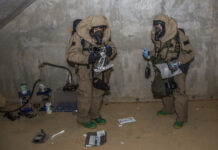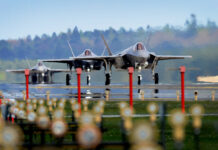Less than a month after the inauguration of Donald Trump as the 47th president of the United States, his administration’s ‘war on woke’ has the Pentagon jumping through diplomatic and cultural hoops, most recently with the second renaming of one of its largest military bases within three years.
In October 2022 the previously named Fort Bragg in North Carolina, home to the US Army’s XVIII Airborne Corps and the headquarters of US Army Special Operations Command, was renamed Fort Liberty as part of efforts to expunge the names of US bases named after Confederate leaders of the American Civil War.
On the X social media channel on 10 February 2025, however, recently appointed US Defense Secretary Pete Hegseth posted a video in which he was seen signing a document and then stating to the camera, “There it is: pursuant to the authority of the Secretary of Defense, Title 10, US States Code Section 113, I direct the army to change the name of Fort Liberty, North Carolina, to Fort Bragg, North Carolina. That’s right: Bragg is back.”
Beyond Hegseth’s video post, though, a US Department of Defense (DoD) press release attributed to DoD Press Secretary John Ullyot offered more details.
“While flying aboard a C-17 [airlifter] from Joint Base Andrews to Stuttgart on February 10, 2025, Secretary of Defense Pete Hegseth signed a memorandum renaming Fort Liberty in North Carolina to Fort Roland L Bragg,” stated the press release. “The new name pays tribute to Pfc Roland L Bragg: a World War II hero who earned the Silver Star and Purple Heart for his exceptional courage during the Battle of the Bulge. This change underscores the installation’s legacy of recognising those who have demonstrated extraordinary service and sacrifice for the nation.”
During the previous US Biden Administration the US Army renamed nine bases named after Confederate generals. The original naming of those bases has a conflicted history. As the American Homefront Project (a US media initiative that reports on the lives of military personnel, veterans and their families) explained in a 26 October 2023 article, “Around the beginning of the 20th Century, groups – notably the United Daughters of the Confederacy – began promoting the ‘Lost Cause’ myth that made heroes of Confederate leaders and blamed the war more on Northern aggression rather than the Confederacy defending slavery. … As the effort to mythologize the Confederacy began gaining traction, the Army – as it rushed to build bases in World War I – decided to name those in the north for Union officers and those in the south for Confederates.”
Fort Liberty was the only base of the nine not renamed after a specific US hero.
The original naming of the base after General Braxton Bragg was a particularly poor choice. As well as being a slave owner, Bragg is widely regarded as one of the worst generals to serve in the American Civil War. Most of the military actions he led ended in defeat and he was by all accounts extremely unpopular with the men under his command.
While the renaming of Fort Liberty back to Fort Bragg will almost certainly be seen by opponents of Trump’s administration as a ‘dog whistle’ to the US white supremacist vote that has bolstered Trump, Secretary Hegseth cannot be tarred with that particular brush. When the Trump Administration’s edict to end all diversity, equity and inclusion (DEI) initiatives across the US military led to the removal of US Air Force training video accounts of the Tuskegee Airmen, the all-Black 332nd Fighter Group that served with distinction in the Second World War, Hegseth had the video reinstated.
A video commemorating the Second World War service of the Women’s Airforce Service Pilots was also reinstated.














